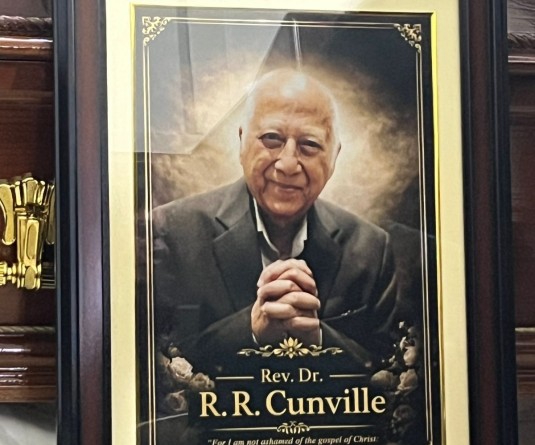
Selie Visa
Scripture: James 3:1-12 NIV
1 Not many of you should become teachers, my fellow believers, because you know that we who teach will be judged more strictly.
2 We all stumble in many ways. Anyone who is never at fault in what they say is perfect, able to keep their whole body in check.
3 When we put bits into the mouths of horses to make them obey us, we can turn the whole animal.
4 Or take ships as an example. Although they are so large and are driven by strong winds, they are steered by a very small rudder wherever the pilot wants to go.
5 Likewise, the tongue is a small part of the body, but it makes great boasts. Consider what a great forest is set on fire by a small spark.
6 The tongue also is a fire, a world of evil among the parts of the body. It corrupts the whole body, sets the whole course of one’s life on fire, and is itself set on fire by hell.
7 All kinds of animals, birds, reptiles and sea creatures are being tamed and have been tamed by mankind,
8 but no human being can tame the tongue. It is a restless evil, full of deadly poison.
9 With the tongue we praise our Lord and Father, and with it we curse human beings, who have been made in God’s likeness.
10 Out of the same mouth come praise and cursing. My brothers and sisters, this should not be.
11 Can both fresh water and salt water flow from the same spring?
12 My brothers and sisters, can a fig tree bear olives, or a grapevine bear figs? Neither can a salt spring produce fresh water.
The most destructive weapon:
There is a weapon, more powerful and more destructive than any other weapon known to man. It is not even a weapon made by man. This weapon has been known to start wars, destroy friendships, devastated relationships, break hearts, cause enmity and spark national revolutions. It has ruined more reputations, wrecked more homes, split more churches, driven more people out of the ministry and caused more hatred than any other weapon in the world. Concealed and deadly, this weapon is the three inch animal that lives in a pool of saliva, behind an ivory cage of teeth and covered by a pair of lips known as “the tongue”.
Gossip is saying nasty things about people instead of good things. Gossip is spreading rumors that might not be true. Gossip hurts people. If you think the world of others, you won't tell the world all about others and their problems.There are few sins people commit in which the tongue is not involved.
Ever wonder why people gossip? The foremost reason--- they want to get noticed so badly, and gossiping gives them that brief moment of fame and attention. In the Decalogue the ninth commandment, "Do not bear false witness against your neighbor" is in a way telling us to be extremely careful with what we say. Bluntly speaking it just means--- shut your mouths unless your words are going to bless people and glorify God.
Gossiping as James tells us:
We have a tendency to talk about other people’s affairs, the unpleasant ones. The Bible warned us to watch our tongues. It warned us against the danger of gossiping but it happens all the time. In James 3:1-12 we are told that genuine religion should exert a controlling influence over a person's tongue. James's treatment of the topic may be broken into three subdivisions:
1) The weighty responsibility of teachers (vv. 1-2);
2) The powerful influence of the tongue (vv. 3-6);
3) and the perversity of the tongue (vv. 7-12).
The judgment of teachers will be especially strict because greater responsibility rests on them. The reason for this is that the teacher's essential instrument, the tongue, has such great influence.The tongue is the most difficult member of the body to control.Since sins of the tongue are hardest to avoid, anyone who can control the tongue is surely able to "keep his whole body" from being used as an instrument of sin.
James illustrates the powerful influence of the tongue by the practice of putting bits into the mouths of horses to make them obey us. A small bit can turn the whole animal. So a person who controls the tongue can control his or her whole being. The next illustration on the influence of the tongue is the rudder of a ship. Compared to the size of the vessel and the power of the gale, the rudder was but a minute part; yet it guided the ship. The tongue also is a small item like the rudder. Yet, also like them, it exerts a powerful influence. The tongue is able to sway multitudes. It can alter the destinies of nations. The destructive potential of the tongue is graphically pictured by a forest fire. Thousands of acres of valuable timber may be devastated by a "small spark."
At creation God gave human beings the dominion over the animals that they have exercised ever since. In its natural state the tongue "is a restless evil,"When James says, "No man can tame the tongue," he is stating that no one by himself or herself can subdue the tongue. This is not to say that God cannot bring it under control, for the tongue of the regenerate person can be controlled by the indwelling Holy Spirit.
The mouth should be used consistently to praise God and to express love and kindness to other people.A plant produces according to its nature, whether figs, grapes, or any other fruit. Similarly a salt spring cannot produce fresh water. Therefore, out of the mouth of a good person come good words, and out of the mouth of a sinful person come sinful words.
A gossip wrapped beautifully as a prayer request:
Prayer time is a subtler version of sharing time. Prayer time usually occurs just before a small group, such as adult Sunday school or Bible study, begins the actual lesson or study. After everyone has had a chance to get coffee and snacks, a group leader will ask if anyone has a prayer need or a prayer request. The gossip will spill the personal news this way:"I'd like to request prayer for Jill, who is experiencing some difficulties right now." Everyone else will nod in agreement, except for Jill, who isn't at the prayer time.Gossip veterans know that you don't give the juicy details until the prayer time actually begins. Since you are "talking to God," you can disguise the gossip as a prayer, and since you're praying for Jill rather than talking about her, you can spill the beans without appearing to take any delight in her unfortunate situation.
-- The Church Case Scenario by Bruce Bickel & Stan Jantz
The tongue determines our eternal destiny:
"But I tell you that men will have to give account on the Day of Judgment for every careless word they have spoken. For by your words you will be acquitted, and by your words you will be condemned" (Matthew 12:36-37).
Words are extremely important, in fact, so important that according to Jesus they determine our destiny. Our words will either justify or condemn us. This same law is common to man. A man is judged to be guilty or not guilty based on testimony, that is, by his or her words.
Conciliatory speech:
A gentle answer turns away wrath, but a harsh word stirs up anger (Proverbs 15:1).
The way one answers another person will have an effect on the response. Therefore it is wise to use a gentle answer to turn away wrath. More than merely gentle or soft, the idea seems to be conciliatory, i.e., an answer that restores good temper and reasonableness. To use a "harsh" word is to cause "pain" and will bring an angry response.
Consequences of speech:
“The tongue has the power of life and death, and those who love it will eat its fruit” (Proverbs 18:21).What people say can lead to life or death. So those who enjoy talking must bear its fruit, whether good or bad. We should be warned by this proverb, especially if we love to talk and gossip.
“Let no corrupt communication proceed out of your mouth, but that which is good to the use of edifying, that it may minister grace unto the hearers” (Ephesians 4:29).God has a divine a purpose for our tongues. Our tongues are for glorifying God. Our tongues are to be used to build up not tear down. When we encourage someone, it changes their life. Our words should comfort the heartbroken, encourage the faint and teach truth and wisdom.
Psalm 19:14 “May the words of my mouth and the meditation of my heart be pleasing in your sight, O LORD, my Rock and my Redeemer.”





